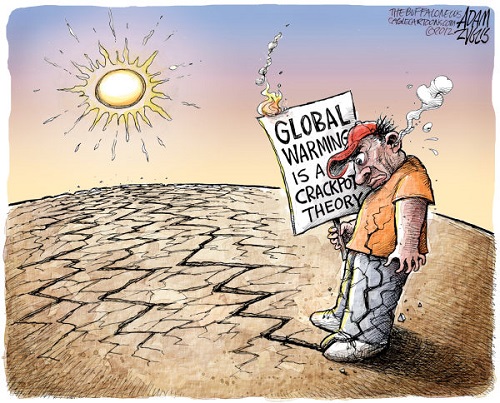2013 SkS Weekly Digest #36
Posted on 8 September 2013 by John Hartz
SkS Highlights
Dana's The Pacific Ocean fills in another piece of the global warming puzzle, and puzzles Curry generated the highest number of comments of the articles posted on SkS during the past week. Why I Resigned from the Editorial Board of Climate over its Akasofu Publication, a guest post from Dr Chris Brierley, University College London, drew the second highest number of comments followed closely by Peter Sinclair's video, Global Warming Includes Oceans Too - and Continues to Rise Fast.
Toon of the Week

Quote of the Week
Humanity has pushed the world’s climate system to the brink, leaving itself only scant time to act, the head of the UN’s group of climate scientists said on Monday.
“We have five minutes before midnight,” warned Rajendra Pachauri, whose organisation will this month release the first volume of a new assessment of global warming and its impacts.
“We may utilise the gifts of nature just as we choose, but in our books the debits are always equal to the credits,” Pachauri told a conference marking the 20th anniversary of the environmental organisation Green Cross International, quoting fellow Indian Mahatma Gandhi.
“May I submit that humanity has completely ignored, disregarded and been totally indifferent to the debits?
“Today we have the knowledge to be able to map out the debits and to understand what we have done to the condition of this planet,” Pachauri said.
U.N researchers: Global warming clock is at ‘five minutes to midnight’ by Agence France-Presse, the Raw Story, Sep 2, 2013
SkS Week in Review
- 2013 SkS Weekly News Roundup #36B by John Hartz
- Global Warming Includes Oceans Too - and Continues to Rise Fast by greenman 3610
- Free Staged Reading of a new Climate Change Play - Extreme Whether in New York September 10th by SonyaLand
- Why I Resigned from the Editorial Board of Climate over its Akasofu Publication by Chris Bierley
- 2013 SkS Weekly News Roundup #36A by John Hartz
- The Pacific Ocean fills in another piece of the global warming puzzle, and puzzles Curry by Dana
- Study offers clues on 20th century global warming wobbles by Sunanda Creagh and Merran Reed
Coming Soon on SkS
- Debunking 97% Climate Consensus Denial (Dana)
- Global imprint of climate change on marine life (John Bruno)
- 2013 SkS Weekly News Roundup #37A (John Hartz)
- Global Warming’s Missing Heat: Look Back In Anger (gpwayne)
- Moncking up the Numbers(Rob Honeycutt)
- Why trust climate models? It’s a matter of simple science (Scott K Johnson)
- 2013 SkS Weekly News Roundup #37B (John Hartz)
In the Works
- The 2012 State of the Climate is easily misunderstood (MarkR)
- How did Ancient Coral Survive in a High CO2 World? (Rob Painting)
- Why Atmospheric CO2 matters: The Really Big Picture (Chris Colose)
SkS in the News
The Cook et al. (2013) 97% consensus paper and result was featured in posts at Media Matters, Rabett Run, Hot Whopper, and Climate Bites. It was also referenced in a new peer-reviewed paper, Histories for an Uncertain Future: Environmental History and Climate Change.
Greg Laden used several SkS graphics to show that CNBC’s Joe Kernen was making up a story about climate change.
Peter Sinclair used The Escalator and SkS ocean heat content graphic in his latest excellent video.
Nafeez Ahmed at The Guardian further discussed the Arctic methane issue, including a reference to Chris Colose’s excellent post, Toward Improved Discussions of Methane & Climate.
Wotts Up With That Blog referenced Dana’s Climate Sensitivity Single Study Syndrome, Nic Lewis Edition.
SkS Spotlights
GFZ German Research Centre for Geosciences
The GFZ, with its research of System Earth, aims to make a substantial contribution to this future task of social custodianship, providing the practical knowledge and technological concepts needed for sustainable “earth-system management.”
GFZ’s long-term aim is to understand the highly complex, non-linear system of the earth and its interactive natural subsystems with their overlapping cycles and widely ramified chains of cause and effect, to comprehend the extent of global change and its regional effects, and to evaluate the influence of human activity on the “System Earth ". Only on this basis, using a thorough understanding of systems and processes, will it be possible to develop strategies and demonstrate options, e.g. to preserve natural resources and to exploit them in an sustainable way, to guard against natural disasters and to reduce their risks, to utilise our habitat, both above and below the ground, and to cope with changes to the climate and the environment and their impact on the anthroposphere.
The GFZ, as a Helmholtz Centre, covers all geo-science disciplines, from geodesy to geo-engineering, working on them in a close interdisciplinary union with the associated sciences of physics, mathematics and chemistry, and with associated disciplines in engineering: rock mechanics, hydraulic engineering and seismological engineering. GFZ’s core areas of expertise lie in developing and applying satellite technologies and space-based measurement procedures; in operating geodetic-geophysical measurement networks; in the tomography of the earth, using geophysical deep-sounding techniques; in undertaking research drilling; in laboratory and experimental technology; and in modelling geo-processes.































 Arguments
Arguments






























Comments